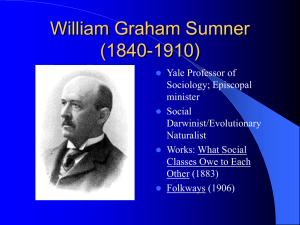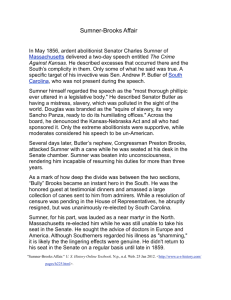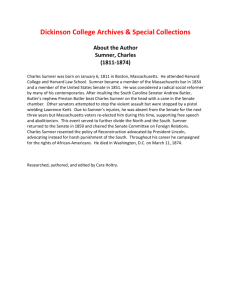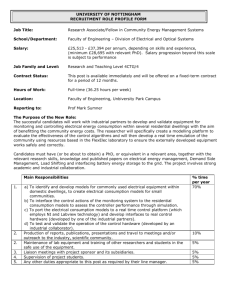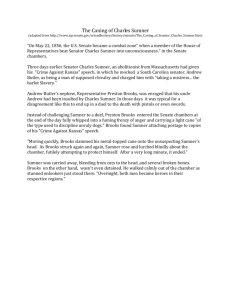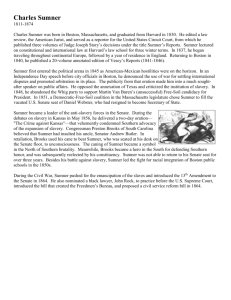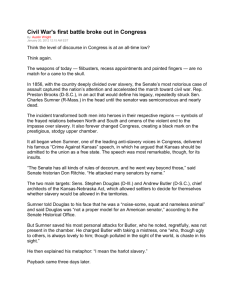MINUTES OF A MEETING OF THE CORPORATION OF SIR JOHN
advertisement
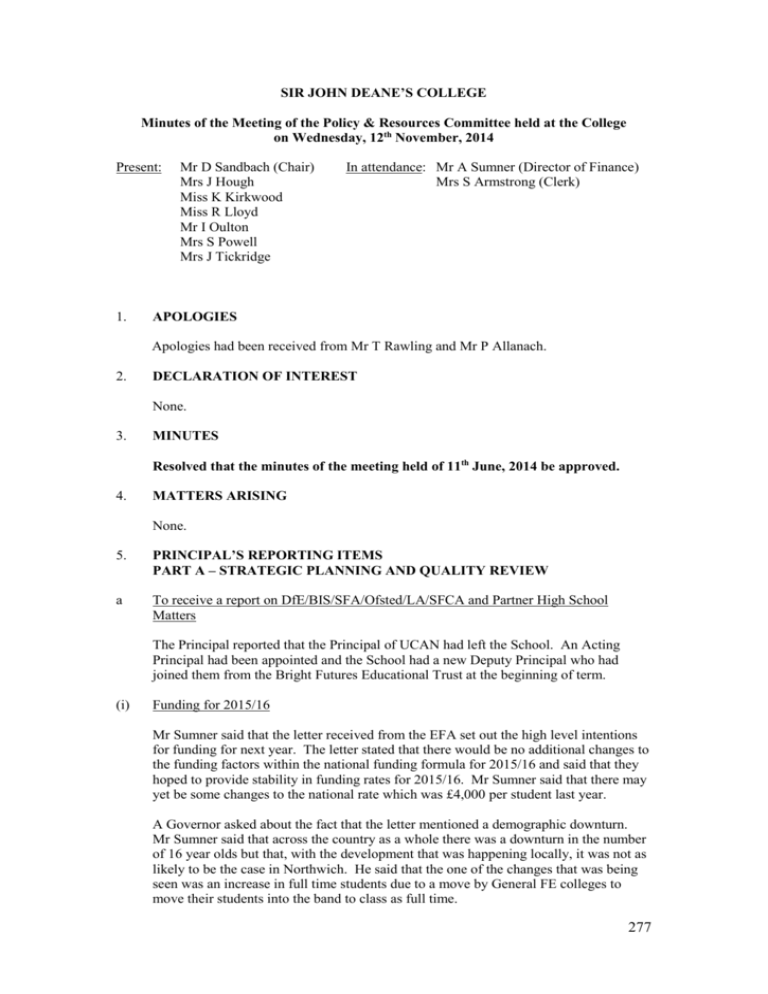
SIR JOHN DEANE’S COLLEGE Minutes of the Meeting of the Policy & Resources Committee held at the College on Wednesday, 12th November, 2014 Present: 1. Mr D Sandbach (Chair) Mrs J Hough Miss K Kirkwood Miss R Lloyd Mr I Oulton Mrs S Powell Mrs J Tickridge In attendance: Mr A Sumner (Director of Finance) Mrs S Armstrong (Clerk) APOLOGIES Apologies had been received from Mr T Rawling and Mr P Allanach. 2. DECLARATION OF INTEREST None. 3. MINUTES Resolved that the minutes of the meeting held of 11th June, 2014 be approved. 4. MATTERS ARISING None. 5. PRINCIPAL’S REPORTING ITEMS PART A – STRATEGIC PLANNING AND QUALITY REVIEW a To receive a report on DfE/BIS/SFA/Ofsted/LA/SFCA and Partner High School Matters The Principal reported that the Principal of UCAN had left the School. An Acting Principal had been appointed and the School had a new Deputy Principal who had joined them from the Bright Futures Educational Trust at the beginning of term. (i) Funding for 2015/16 Mr Sumner said that the letter received from the EFA set out the high level intentions for funding for next year. The letter stated that there would be no additional changes to the funding factors within the national funding formula for 2015/16 and said that they hoped to provide stability in funding rates for 2015/16. Mr Sumner said that there may yet be some changes to the national rate which was £4,000 per student last year. A Governor asked about the fact that the letter mentioned a demographic downturn. Mr Sumner said that across the country as a whole there was a downturn in the number of 16 year olds but that, with the development that was happening locally, it was not as likely to be the case in Northwich. He said that the one of the changes that was being seen was an increase in full time students due to a move by General FE colleges to move their students into the band to class as full time. 277 In response to a question as to whether a change of Government would impact the funding, Mr Sumner said that the AoC were saying that there would be no changes for next year. The next parliament will have to make significant savings, whoever is in power and so the message was not optimistic. The Committee discussed the large programme uplift that was detailed in the EFA’s letter and whether that was an opportunity to increase funding. Mr Sumner said that it was not worth trying to grow larger programmes because the extra costs for them would be more than the 10% uplift that was paid for these programmes. The Principal said that the College would consider allowing students to take 4 or 5 subjects. However Oxbridge and the Russell Group Universities predominantly required only 3 subjects at A Level and were often asking for A*, A and B grades in those subjects. Mr Sandbach asked about the conditions of the funding for GCSE Maths and English. The Principal confirmed that any student who did not have Grade C or above in those subjects was automatically on a re-sit programme for which the College did receive funding. It was a pre-requisite of the funding that they pass their GCSE and there would be a retention of funding if they did not. She added that there was only a very small number of students at the College who needed to re-sit either Maths or English GCSE. (ii) SFCA Proposals for reform of Professional Standards Payments Mr Sumner said that there was currently a nationally agreed pay scale for teachers and support staff which was agreed by the SFCA and the Unions. Teachers were appointed to a six-point pay scale and received an automatic incremental pay rise each year. Once they reached the top of their scale they had to apply for PSP and had to demonstrate that they had met certain standards in order to qualify for that payment. There was a feeling that the process was not robust enough and that the standards required to qualify for PSP were not high enough. The SFCA had come up with a different approach which had the benefits of linking pay with performance and appraisal. There would be no automatic progression through the pay scales apart from NQT’s moving up at the end of their first year. The SFCA’s proposal also had the benefit that some pay scales would change which would make the lower pay scales more attractive. There were a few scales where pay would reduce and the College would need to protect the pay of teacher’s who were affected by that for one year. Governors questioned why the protection was not for three years and Mr Sumner said that, subject to satisfactory performance, all staff would move up on their pay scales after one year and would then be earning more than without the need for pay protection. The SFCA would be asking colleges to vote on the proposals at their AGM the following week. Across the sector as a whole, the proposals would be cost neutral. However, within that there were “winners and losers” and there had been a mixed response across the sector because the proposals came with a cost for a number of colleges. The proposals would mean an additional cost of £20,000 for the College which would start in September 2015. The College had 14FTE teachers who would receive a pay rise if the proposals were introduced. Governors asked if the vote on the proposals would be binding across all colleges and the Principal confirmed that they would be. She added that the proposals would allow the College to define “satisfactory” performance for teachers at the College and they would need to achieve a Value Added 278 score of 4 in the majority of their teaching groups in order to qualify for the additional payments. Mr Sumner said that whatever the outcome of the vote was, there is a huge benefit in nationally agreed pay negotiations. He said that if it was introduced in September 2015 there would be practical issues in terms of timing that the College would need to resolve. The Principal said that the proposals would be a good cultural shift for teachers. It would also allow the College the flexibility to reward excellent teachers by moving them up the scale at a pace set by the College. b. To consider updates to other Strategic Planning and/or Financial Forecasting information All financial issues were covered under other agenda items. c. To recommend the approval of the annual financial statements Overview Mr Sumner said that several figures were missing in the summary document under performance against financial targets. These figures were: Cash days in hand – 128.5 (Target >45) External debt to annual income – 37.2% (Target <40%) Borrowing Costs to Income – 2.29% (Target <7%) Revenue Reserves to Income – 44.4% (Target >10%) Mr Oulton asked if the External Debt to Annual Income figure was lower than it had been last year. Mr Sumner confirmed that that figure was reducing. He said that there might be different figures in the financial forecast as there had been a change in the way the College accounted for some of its income. He said that all targets had been met and there had been a surplus at the end of the year compared with a deficit which had originally been forecast. In cash terms, the College was slightly better off. The operating cash flow had reduced but was still over £350,000. Income overall had reduced by 1.3% and the number of students at the College had increased by 4.8%. Report and Financial Statements The report was in the standard format and mirrors the wording in the model set of accounts. Mr Sumner said that it was now a requirement of the Charities Commission that the College put a copy of the accounts on its website. Pages 17 and 18 detailed that there had been a clean audit report on both regularity and the trueness and fairness of the figures. There were no unadjusted errors in the accounts. Mr Sumner said that the Pension Liability figures on the balance sheet would only have any affect if the scheme were to be closed down. There were several actuarial assumptions within the figures and those were detailed on page 24 of the Report and 279 Accounts. The net debt had reduced due to the fact that the College had paid off some of its loan. The AoC had issued an addendum regarding the Teachers’ Pension which was included in the Accounts. Mr Sumner said that he would talk to Mr Benson regarding some changes to the wording of that but there would be no change to the numbers. Resolved that the Annual Financial Statements be recommended to the Board for approval. 6. PRINCIPAL’S REPORTING ITEMS PART B – SMT RISK MANAGEMENT CONTROL REPORT a. To receive a report on financial control issues (inc. retention/update on associated funding for 2014/15 The Principal said that an audit would be carried out of student hours, the result of which would be fed back to both Curriculum & Quality and Policy & Resources so that governors could be assured that students are doing the relevant number of hours in order to be classified as full time. The College currently had 24 students who would be 19 by the end of the programme. The change in terms of funding last year would mean that the College would receive 17.5% less funding in respect of those students. Mr Sumner said that that needed to be included into the financial model so that full funding was not assumed for every student. b. To receive a report on other operational review items (inc. Quality Assurance, Premises and Equipment The Principal reported that teachers had been advised to set homework for students in every lesson to keep them on track. Focus groups were being held with students and the majority of them confirmed that they were receiving short homework from each lesson. The Student Governor said that she had experienced an increase in homework at the beginning of the year but that it was dropping off now. She said that it was useful to have more work set as it gave guidance as to what students should be studying. In response to a question from another governor regarding the standard of marking and feedback on her work the Student Governor confirmed that all homework was followed up by teachers. c. To receive a report on Safeguarding The Principal said that an internal audit of Safeguarding was due. The College had been working with the Police as there had been a number of issues around the canal area. Recently a single girl had been stopped by an adult male as she walked by the canal. The Police did not appear to be taking the type of action that the College would like to see. The College had alerted all students to be aware if they were in that area. Governors were concerned to hear of the recent events and Mrs Hough said that she would follow the issue up with the Police. d. To receive a report on Health and Safety There was nothing to add to Mr Lupton’s latest report which was included in the latest 280 SLT Control minutes. A Governor said that she had been disappointed in the coverage by the Northwich Guardian regarding parking on the College’s site. The Principal said that, following the article, she and Mr Sumner had met with two members of the Professional Drivers’ Consortium. She said that they would stick with the decision not to allow Driving Instructors to pick up or drop off pupils on site. Apart from the reduced risk of accidents due to fewer cars being on site, the traffic management had been much better since the ban and buses were able to leave the site a lot quicker than they had previously been able to. 7 Policies a. To approve the Management of Absence Policy The Principal said that the revised Management of Absence policy was a significant shift. It mirrored the good practice which had been taking place in Hartford High School. It also mirrored the Disciplinary Policy and absence would now eventually evoke disciplinary procedures. A Governor asked if the policy would be worked through if a colleague was off sick. The Principal said that it was not worked through in the same way but that they do make a judgement on the colleague’s return to work about how to manage their return. If someone was off due to a serious illness or an operation they would manage the situation carefully and situations would be handled differently depending on the reason for the absence. Resolved that the Management of Absence policy be recommended for approval. b. To approve the Financial Regulations Mr Sumner said that there were no major changes but that details such as titles, authorised signatories, EU procurement thresholds and bank details had been updated. Mr Sumner said that he had looked at the model Financial Regulations that CIPFA had produced with universities in mind. He said that the College’s Financial Regulations had become more detailed over the years as auditors had wanted more in them but that he would like to condense it to a more high level document. He said that there should not then be the requirement to change the document so often. Resolved that the Financial Regulations be approved. 8. ANY OTHER BUSINESS Copies of a document from the Education Funding Agency on Sixth Form College financial key performance indicators had been distributed. Mr Sumner had reviewed the document and said that governors had already received all the information in various other documents. The benchmarking information showed the number of colleges in each financial category. It showed the decline in the number of outstanding colleges and the shift that had happened from outstanding to good. 281 10. DATE AND TIME OF NEXT MEETING 4th February, 2015 at 2.30 pm 282
